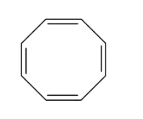Explain why alkyl groups act as electron donors when attacted to a π−system.
Step-by-Step Solution:
1. Understanding Alkyl Groups: Alkyl groups are hydrocarbon substituents derived from alkanes by removing one hydrogen atom. They are generally electron-rich due to the presence of carbon-hydrogen (C-H) bonds.
2. Definition of Pi-System: A pi-system refers to a system of overlapping p orbitals that allows for the delocalization of electrons, typically found in double bonds (alkenes) or aromatic compounds.
3. Hyperconjugation Concept: Hyperconjugation is a stabilizing interaction that results from the overlap of a filled sigma bond (C-H or C-C) with an adjacent empty or partially filled p orbital. This interaction allows for the delocalization of electrons.
4. Mechanism of Electron Donation: When an alkyl group is attached to a pi-system, the electrons from the sigma bond of the alkyl group can interact with the pi-system. This occurs because the sp³ hybridized carbon of the alkyl group has a sigma bond that can overlap with the p orbitals of the pi-system.
5. Delocalization of Electron Density: The electron density from the alkyl group’s sigma bond is donated to the pi-system. This donation increases the electron density in the pi-system, making it more stable and less reactive.
6. Stabilization of the Pi-System: The process of hyperconjugation leads to the stabilization of the pi-system by extending the molecular orbital. This results in a lower energy state for the molecule, contributing to its stability.
7. Conclusion: Therefore, alkyl groups act as electron donors when attached to a pi-system due to the hyperconjugation effect, which facilitates the delocalization of electrons and stabilizes the overall molecular structure.
Topper's Solved these Questions
- ORGANIC CHEMISTRY- SOME BASIC PRINCIPLES AND TECHNIQUESBOOK - NCERT ENGLISHCHAPTER - ORGANIC CHEMISTRY- SOME BASIC PRINCIPLES AND TECHNIQUESEXERCISE - EXERCISE
40 Videos
- HYDROGENBOOK - NCERT ENGLISHCHAPTER - HYDROGENEXERCISE - EXERCISE
36 Videos
- REDOX REACTIONSBOOK - NCERT ENGLISHCHAPTER - REDOX REACTIONSEXERCISE - EXERCISE
30 Videos
Similar Questions
Explain why can more than 8 electrons not be accommodated in L shell?
View SolutionExplain why is OH group in phenols more strongly held as compared to OH group in alcohols ?
View SolutionExplain why is OH group in phenols more strongly held as compared to OH group in alcohols ?
View SolutionExplain why the system are not aromatic?

View SolutionExplain why the system are not aromatic?

View SolutionExplain why the system are not aromatic?

View SolutionExplain why :
The electron affinities of Be and Mg are zero.
View SolutionExplain why :
Fluorine has lower electron affinity than chlorine.
View SolutionExplain why The colour of Baeyer's reagent gets discharged when treated with an alkene.
View SolutionExplain why particles of a colloidal solution do not settle down when left undisturbed, while in the case of a suspension they do?
View Solution